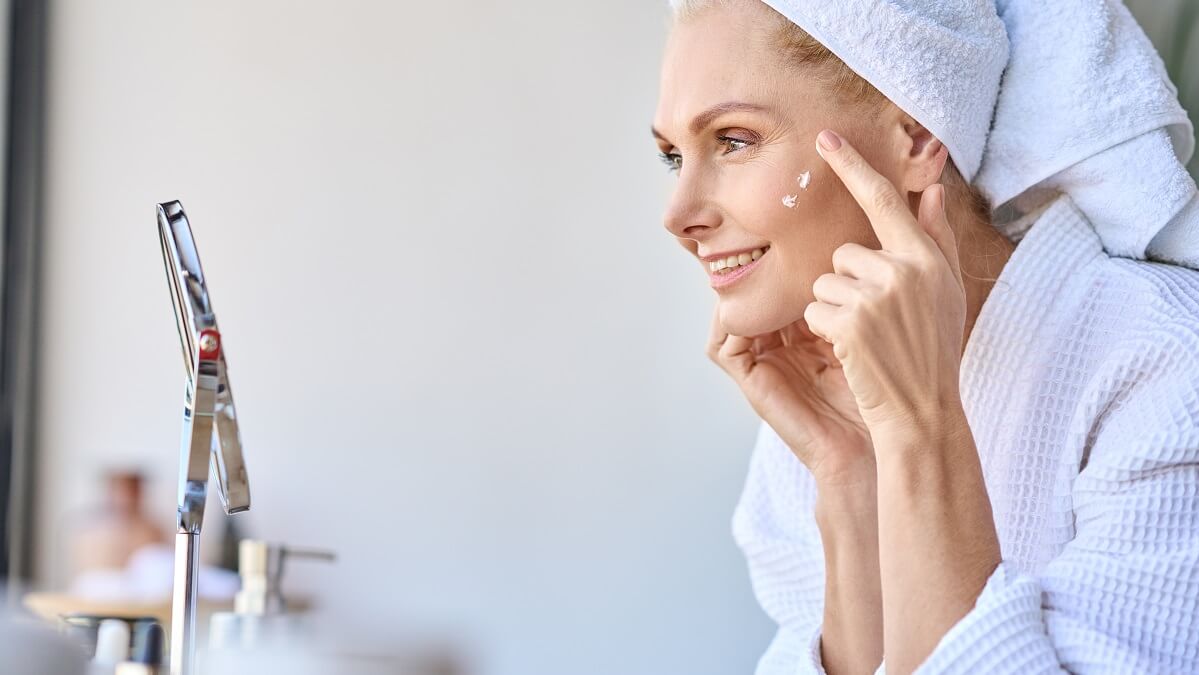Loss of collagen is the number one cause of skin ageing. Rejuvenating collagen levels not only leads to younger looking skin, but also assists healing and creates stronger nails and healthier hair.
“Collagen is our most abundant protein,” says dermatologist Dr Thurein Ne Win. “It’s commonly found in the skin, bones and connective tissue within the body, providing structural support, strength and a degree of flexibility where needed.
“Collagen is naturally produced in the body. However, it gradually starts to deplete from the age of 25, which can lead to sagging of the skin and the formation of wrinkles and fine lines.”
You’ll find collagen in the middle layers of your skin. This is the area responsible for most signs of ageing, such as crow’s feet, wrinkles and sagging.
Age is the primary cause of collagen loss and ‘lazy’ skin. UV exposure is also a major cause. Once you lose this vital protein, your skin loses elasticity and firmness and once gravity has its way, well, you know the rest.
It’s crucial to understand that you cannot regenerate ‘new’ collagen after a certain age. Collagen production peaks at some point in your 20s and declines over time. It declines around 1 per cent per year until you hit menopause. Then, you’ll cop a 30 per cent drop after which it declines at around 2 per cent per year. So, the trick is you look after what you have left.
What can you do to boost your collagen levels?
There are treatments – some safe, some not so safe, some you can do yourself and some that require professional help.
Drinking plenty of water, exercising and wearing sunscreen are the best ways to keep your skin hydrated and wrinkle-free, but a balanced diet rich in essential fatty acids, antioxidants and proteins is key.
Think organic red meat and chicken, wild fish and eggs. Other foods such as bone broth, citrus and tropical fruits, berries, garlic, avocado, leafy greens and cashews should also consistently be on your menu. Watermelon is high in lycopene which protects your skin against UV damage. Shellfish is high in zinc which accelerates the renewal of skin cells.
Bad foods for skin
Foods high in sugars, or those containing a lot of white flour and other refined carbs, contribute to a process called glycation, which leads to collagen degradation. When collagen molecules mesh with sugar molecules, it can make the collagen brittle and stiff.
Alternatives to the ‘food cure’
There are myriad topical products that contain collagen and which claim to reduce ageing. However, topical application is a useless exercise. Collagen and collagen peptides are too large to be absorbed topically.
It’s not the collagen doing the work in many of these skincare products. Those that contain retinoids can help to regenerate skin by giving it a glowing, ‘plumper’ appearance, but the best way to boost collagen is to ingest it.
Could supplementation be the ‘fountain of youth’?
There are many supplements that claim to boost your collagen levels and reduce ageing. Look for those containing vitamins C and E – both important nutrients for skin health. An antioxidant called astaxanthin is a potent carotenoid that can protect your skin from wrinkles and signs of ageing. You can find those supplements in pill or powder form.
Is it ever too late to start using anti-ageing products?
A natural product specially designed for women over 50, GLOW AGELESS by The Beauty Chef, comes in powder form and can be added to a daily smoothie, water or juice.
GLOW AGELESS doesn’t contain collagen peptides; instead, it works by providing the right nutrients to support your body’s own natural production of collagen. It not only helps stimulate collagen production and reduces signs of ageing, but it also works to boost your gut health and energy levels.
Collagen also supports healthy hair and nails and improves bone and thyroid hormonal health. It may not be the fountain of youth, but certainly sounds like the elixir of life!
Drinking products that help maintain collagen production have increased in popularity in recent years. While many may find the prospect of ‘drinking’ their skincare regimen odd, “some people find it easier than taking multiple capsules, and generally it’s absorbed easily and more quickly,” says medical director Dr Preema Vig.
Of course, taking a supplement is not the be-all for reducing signs of ageing. Any good skincare regimen should include a healthy diet, plenty of water, quality moisturisers and UV30+ sunscreen.
Disclosure: The Beauty Chef is a YourLifeChoices affiliate. YourLifeChoices is dedicated to keeping our content and resources free. To that end, we may earn money should members click some of the links on this page.
Disclaimer: This article contains general information about health issues and is not ‘advice’ because it does not consider your personal health requirements or existing medical conditions. For health advice, and before taking any supplements, always consult your medical practitioner.

